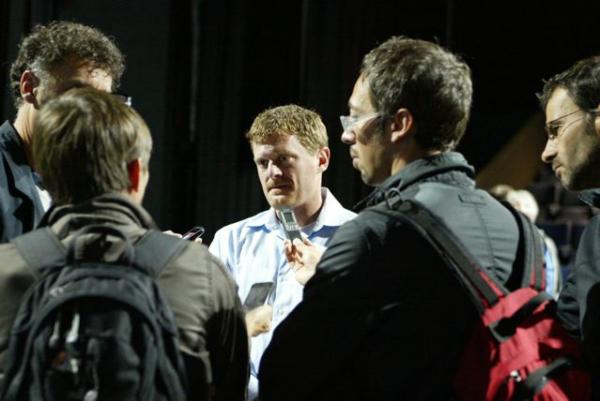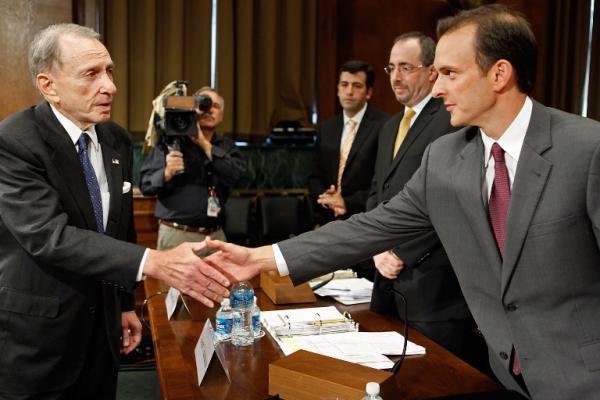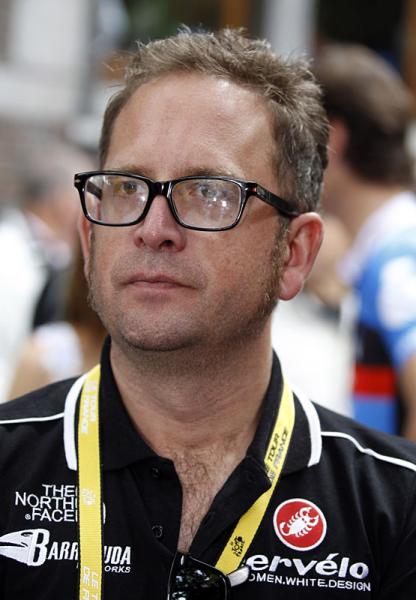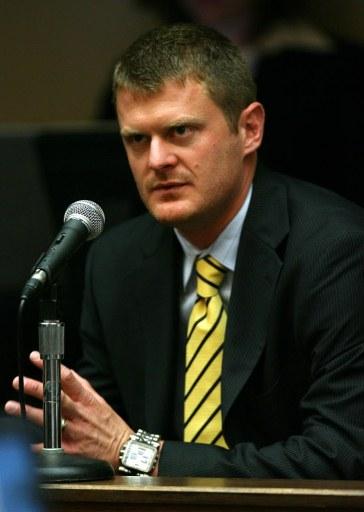Yale panel describes dismantling cycling's doping culture
Tygart, Vaughters light the way forward





The "Spinning Our Wheels" panel discussion at Yale University offered little new information on the fight against doping in cycling, but panel participants Jonathan Vaughters and Travis Tygart gave some insights into what must be done to ensure clean sport.
Floyd Landis made his first public appearance since 2010, but was not at liberty to speak about the most pressing issue - his Federal whistleblower lawsuit against Lance Armstrong and Johan Bruyneel. He was addressed only a few times, once to clarify a statement made in an interview with Paul Kimmage, and only spoke in general terms about his history and his decision to come forward.
Yale professor Thomas Murray provided some context for the discussion by speaking about the "ecosystems" that enable doping. He compared the current situation in cycling to the state-sponsored doping in East Germany before the Berlin Wall fell, and noted that individuals who were involved in the doping regime fled to China and coincidentally athletes began to excel and test positive there.
It brought to light the main theme of the evening, which was that until the system that allows doping to occur is dismantled, it will be very difficult to ensure clean athletes get a fair chance.
Tygart spoke of the essence of sport, and he contrasted professional wrestling with Olympic wrestling - pure entertainment versus pure sport. "They have two entirely different purposes. You have to ask the question, if we open it up, or we don't use best efforts to ensure clean athletes can compete on a level playing field, you take a risk that sport is not going to maintain its essence - which is pushing human, not artificial, performances as far as you can."
Vaughters went on to describe how the EPO-fueled peloton in the late 1990s and 2000s was artificial, and how other kinds of drugs lacked the kind of power to create the kind of culture of acceptance that resulted from that era. He made the point that EPO caused the sport itself to be transformed, but it was the code of silence that was critical in perpetuating its use.
"In the early 1990s, with the advent of EPO, and at that point you had this drug that is so incredibly effective at enhancing performance that after a few years, you hit a critical mass. With that critical mass it became, at the highest level, essentially obligatory to use the drug, or else you were not going to be competitive - which is something that never happened in history of cycling before," Vaughters said.
Get The Leadout Newsletter
The latest race content, interviews, features, reviews and expert buying guides, direct to your inbox!
"Where we went wrong in all that was with the reaction time. You could have asked me in 1996, where is this going to go? People weren't talking about this as a huge problem in 1996. I would have said, privately, this is the biggest problem in the sport. It's enormous, the undertow is incredibly strong here. That wasn't being acknowledged publicly. By public acknowledging, by saying this drug is causing the whole face of the sport to change, that could have caused a reaction."
Tygart described his investigation into the doping culture as being initially hampered by the distrust riders had in the authorities,
"Hearing the stories which at the time were allegations, we had a duty to follow up on those allegations. A common thread we heard was a distrust of the entities who were responsible for enforcing or protecting their right. We had the candid conversation that as long as you remain truthful and fully truthful - you can't just tell us information that protects your friends - then we are going to take that as the independent agency whose job it is solely, not to grow sport or be concerned about revenues, but to protect athletes and the integrity of sport.
"We are going to take that and hopefully use that to dismantle the system that allowed this culture to flourish, because we owe it to that next generation of athletes that they never have to walk into a culture that so easily allows people to justify cheating in the fashion that cheating was going on with these dangerous drugs.
"Its why we gave every rider including Armstrong the opportunity to come in and be a part of this solution, in order to try and dismantle the system."
Vaughters clarified that the cooperation of the riders was not to "go after Lance Armstrong". "What Travis said, and what FLoyd said, was we need to change what the sport is, we need to change the foundation it is built on, we need your help. It wasn't about any particular individual or team, it was about disrupting the system that was in place."
Has the system been dismantled? It was not a question posed or one that can be accurately answered, but Vaughters argued that the times up Alpe d'Huez which were quickest in the height of the EPO era, have dropped to 1989 levels, and riders with power-to-weight rations 10% lower than the previous years are winning Grand Tours.
How to keep the momentum and prevent the sport from slipping back into its doping ways, Vaughters said "is a delicate and tricky proposition", requiring all riders to work together as well as increasing funding for enforcement.
Interestingly, Vaughters revealed that the AIGCP teams association, of which he is the outgoing president, would support the teams financial contribution to the anti-doping effort, which is now just one per cent of most team budgets, but that there was an attitude of mistrust toward the UCI's use of the funds. "That is changing," Vaughters said. The UCI is considering moving its anti-doping efforts to an independent organization.
Both Vaughters and Tygart disagreed with the type of "zero-tolerance" policy implemented by teams like Sky, with Tygart advocating for a "limited amnesty" process as the only way to ensure riders will feel safe to come forward with information.
"If you know the consequences are you lose your job, [these policies] have the opposite effect. It continues to foster the code of silence. Nobody in their right mind who as bills to pay or families to raise and voluntarily come forward."
Tygart said that by offering limited amnesty, by giving athletes who doped a chance to come forward and tell the whole truth, that zero tolerance can then be expanded, "to impact teammates". He did not give details on this idea, but indicated that it would create a system of peer pressure not to dope, in sharp contrast to the previous culture of peer pressure to dope.

Laura Weislo has been with Cyclingnews since 2006 after making a switch from a career in science. As Managing Editor, she coordinates coverage for North American events and global news. As former elite-level road racer who dabbled in cyclo-cross and track, Laura has a passion for all three disciplines. When not working she likes to go camping and explore lesser traveled roads, paths and gravel tracks. Laura specialises in covering doping, anti-doping, UCI governance and performing data analysis.